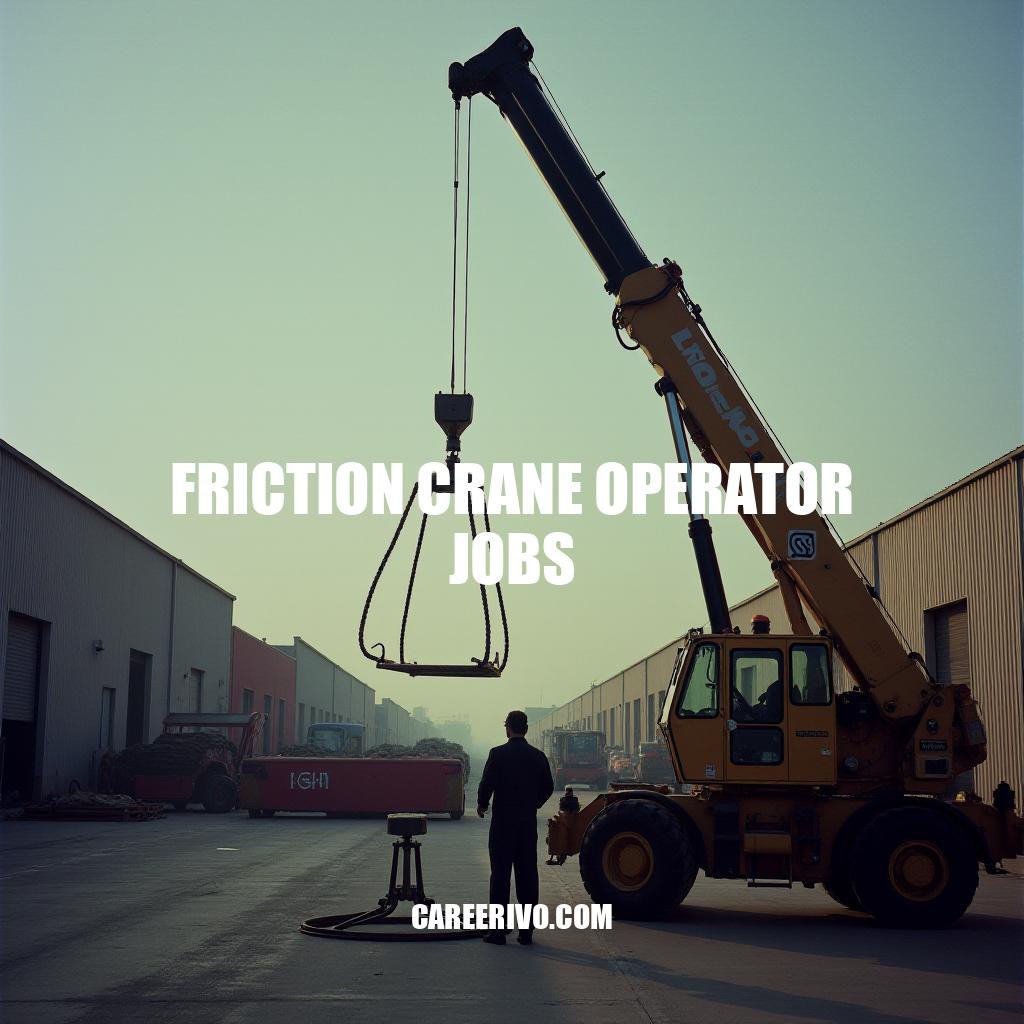
Friction crane operator jobs are in high demand in the construction industry, where skilled operators are needed to manage complex crane operation tasks. As a friction crane operator, you’ll play a critical role in ensuring the safe and efficient movement of heavy loads on construction sites. With the industry’s growing need for experienced operators, now is an excellent time to explore career opportunities in this field.
Job Description and Responsibilities
A friction crane operator plays a critical role in construction projects, with key crane operator responsibilities including:
- Operating friction cranes to lift, move, and place heavy loads.
- Conducting pre-operational checks on cranes and equipment.
- Ensuring safe working practices and adherence to safety regulations.
Friction crane operation requires attention to detail and a strong understanding of job duties, including:
| Duty | Description |
|---|---|
| Load management | Lifting, moving, and placing heavy loads safely. |
| Equipment maintenance | Conducting regular checks and maintenance on cranes and equipment. |
| Safety protocols | Ensuring safe working practices and adherence to safety regulations. |
Required Skills and Qualifications
To become a successful friction crane operator, you’ll need to possess essential crane operator skills, including:
- Strong understanding of crane operations and safety protocols.
- Excellent hand-eye coordination and spatial awareness.
- Ability to work at heights and in challenging weather conditions.
Friction crane certification and relevant qualifications may also be required, such as:
| Qualification | Description |
|---|---|
| Crane operator certification | Certification from a recognized organization, such as NCCCO. |
| OSHA training | Training on Occupational Safety and Health Administration regulations. |
| Medical certificate | A medical certificate ensuring fitness for crane operation. |
Job Outlook and Salary
The crane operator salary for friction crane operators can vary depending on experience, location, and industry. However, here are some general job outlook and industry trends:
- Median salary range: ₹8-15 lakhs per annum in India.
- Job growth prospects: 10-15% growth in the construction industry.
- Industry demand: High demand in construction, infrastructure, and industrial sectors.
Here’s a summary of crane operator salary and job outlook:
| Industry | Salary Range | Job Growth |
|---|---|---|
| Construction | ₹8-15 lakhs | 10-15% |
| Infrastructure | ₹9-18 lakhs | 12-18% |
| Industrial | ₹10-20 lakhs | 15-20% |
People Also Ask Questions
Common questions about friction crane operator jobs include:
- Q: What qualifications are required to become a friction crane operator? A: A valid crane operator certification and relevant training.
- Q: What are the primary responsibilities of a friction crane operator? A: Operating cranes, ensuring safety, and maintaining equipment.
- Q: What is the average salary for a friction crane operator? A: ₹8-15 lakhs per annum in India.
Here’s a summary of FAQs:
| Question | Answer |
|---|---|
| Qualifications | Crane operator certification and relevant training |
| Responsibilities | Operating cranes, ensuring safety, and maintaining equipment |
| Salary | ₹8-15 lakhs per annum |
Tips for Becoming a Friction Crane Operator
Pursuing a career as a friction crane operator requires:
- Friction crane training from a recognized institution.
- Gaining experience through internships or apprenticeships.
- Obtaining necessary certifications, such as crane operator certification.
Becoming a crane operator also requires:
| Tip | Description |
|---|---|
| Networking | Building relationships with industry professionals. |
| Continuous learning | Staying updated in safety protocols and regulations. |
| Physical fitness | Maintaining physical fitness to handle demanding work. |
In conclusion, becoming a friction crane operator is a rewarding and challenging career path that requires attention to detail, physical fitness, and a strong understanding of safety protocols.
With high demand in the construction industry and competitive salaries, now is an excellent time to explore this field. By following the key takeaways outlined in this article, you’ll be well on your way to launching a successful career as a friction crane operator.
Whether you’re just starting out or looking to transition into a new role, we encourage you to pursue your passion and join the ranks of skilled operators who are shaping the construction industry.
Share your thoughts and experiences with us in the comments below, and don’t forget to explore related resources for further learning and growth.


